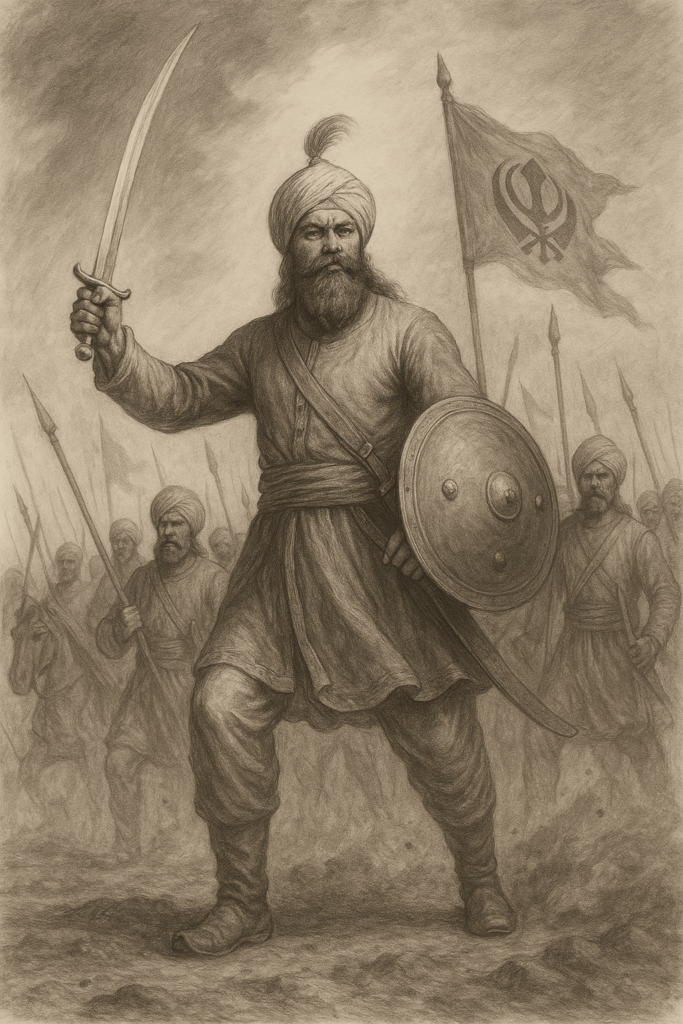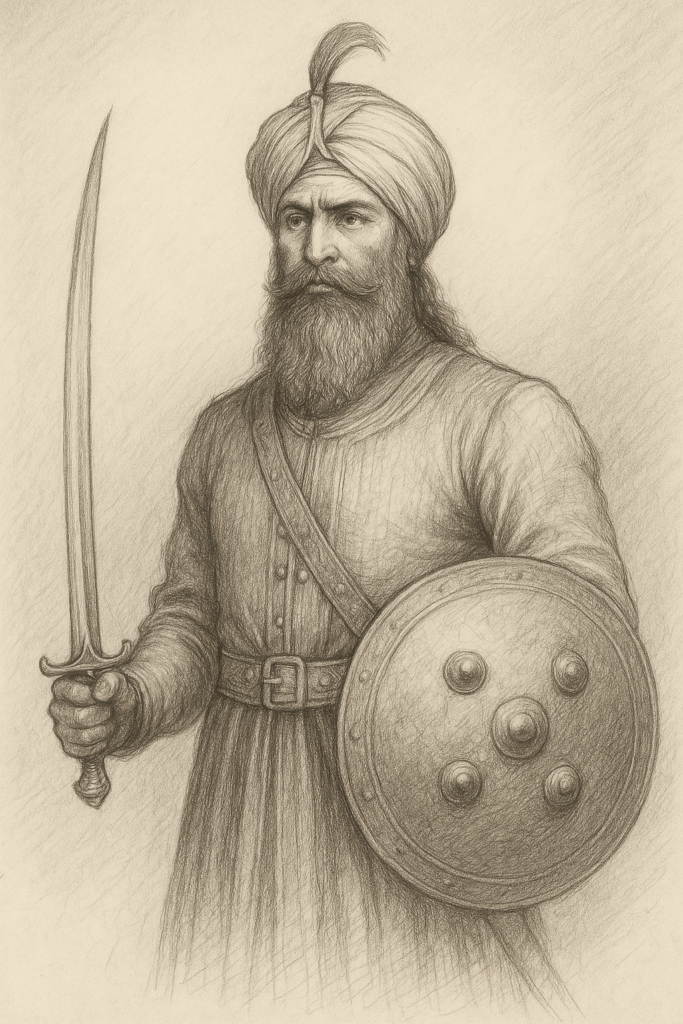“Bharat maa ke veer putra kabhi mitt nahin sakte. Veer Shiromani Hari Singhji Nalwa ka naam itihaas ke har panne par amar rahega.”
(“The brave sons of Mother India can never be erased. The name of Veer Shiromani Hari Singhji Nalwa will remain immortal on every page of history.”)

Any narrative of Indian history is incomplete without the mention of Hari Singh Nalwa, one of the greatest warriors India has ever produced.
Harisingh Nalwa was born in a Sikh family of Gurdayal Uppal and his wife Dharma Kaur at Gujranwala, in the Punjab province of present-day Pakistan, on 28 April 1791. His father died when he was 7 years old.
His real name was Harisingh. As a young boy, everyone simply knew him as “Hariya” a spirited child with a spark in his eyes.
But destiny had grander plans for him. He was just 14 when his fate took a dramatic turn. Eager to discover new talent, Maharaja Ranjit Singh, organized a competition to test the mettle of Punjab’s finest youths. In the crowded arena, Hariya stepped forward — and what followed left the gathering spellbound. His arrows struck their mark with unerring precision, his sword moved with a speed and grace few had ever seen, and his spears cut through the air like lightning. The Maharaja, saw more than just skill — he saw raw courage, discipline, and a spirit that refused to be contained. Ranjit Singh bestowed upon the young warrior a new name — “Nalwa” — after King Nal, the famous ruler of Nishadha, who is remembered for his courage, bravery, loyalty, and the timeless love story of Nal and Damayanti told in the Mahabharata. Thus, Hari Singh Nalwa was born, not just as a name, but as a force that would soon carve his place into the very heart of Indian history.
Maharaja Ranjit Singh immediately recruited young Harisingh into his army and Harisingh soon rose to become one of the Maharaja’s most trusted confidants. One day, while accompanying the Maharaja on a hunting expedition, they ventured deep into a dense forest in search of prey. A ferocious lion suddenly emerged from the thickets and attacked Maharaja Ranjit Singh himself.
Before anyone could react, the lion pounced and knocked the Maharaja to the ground. This is when young Harisingh sprang into action. In a swift, fearless motion, he seized the lion’s jaws with his bare hands and wrestled the beast away from the Maharaja before beheading the lion with his sword.
Overwhelmed by his extraordinary bravery and courage Maharaja Ranjit Singh said, “O Harisingh! You are truly Nalwa — brave like the legendary King Nal!”
From that moment onward, Harisingh came to be popularly known as “Nalwa,” and later, was honoured with the title of Sardar. From that day onwards Hari Singh Nalwa never looked back and quickly rose through the ranks, becoming not just as one of the most celebrated commanders of Maharaja Ranjit Singh’s Khalsa Army, but also one of the greatest generals the world has ever known.

Throughout his life, Hari Singh Nalwa fought many battles under the harshest of conditions — often outnumbered, often facing impossible odds — yet time and again, he carved out victory through sheer courage and brilliant strategy.
His victories in the Battle of Multan, the Battle of Jamrud, and the Battle of Nowshera are not just tales of war — they are monuments to courage, leadership, and an iron will that refused to surrender.
Nalwa’s victories were not just battles won — but promises kept to the motherland. With every battle he fought, Hari Singh Nalwa etched another chapter of glory in the story of India.
For almost a decade in the 1813’s Hari Singh Nalwa crushed resistance across Kashmir, Attock, Multan, and Peshawar, leading Maharaja Ranjit Singh’s Vijay Abhiyan to a roaring triumph.
By 1824, under Nalwa’s command, the Sikh Empire flourished in Kashmir, Multan, and Peshawar — liberating countless innocents from the bloodstained rule of savage invaders who had plundered the land for centuries.
In the brutal Battle of Multan, when the fate of the campaign hung in the balance, Hari Singh Nalwa, led the Jhanda Dal — the self-sacrifice squad — into the heart of the enemy, tearing down their defences and securing a legendary victory with his own sword dripping in the blood of tyranny.

At that time, the lands that today form Pakistan and Afghanistan were no more than a patchwork of warring fiefdoms, ruled by barbaric tribal chiefs and ruthless Muslim kings who spread terror and lawlessness. Maharaja Ranjit Singh, placed the future of the frontier in Nalwa’s hands — and in doing so, unleashed a force that enemy kings and marauding tribes would come to dread for generations.
Hari Singh Nalwa was not just a general — he was a storm unleashed upon the enemies of India. Wherever tyranny raised its head, Nalwa’s sword answered with justice. Wherever invaders sought to oppress, his roar shattered their courage. At the wild frontiers of Peshawar, in the shadow of the Khyber Pass, where empires had fallen and invaders once marched unchecked into India, it was Hari Singh Nalwa who stood like an unbreakable wall — a lone lion guarding the gateway of the nation. Under his iron rule, the thundering hooves of invaders were silenced, the blood-soaked raids were crushed, and for the first time in centuries, the borders of India breathed freely under the protection of the Khalsa flag.
With unmatched courage and military brilliance, Hari Singh Nalwa swiftly brought together the fragmented and chaotic regions of the frontier under the banner of the Khalsa Empire.
Though it took years of fierce and bloody battles, no force could withstand the onslaught of his strategy and power. He showed no mercy to those who opposed him — and it was this fierce reputation that struck terror into the hearts of his enemies long before he even set foot on the battlefield.
When Peshawar, ruled by Sultan Muhammad — the brother of the King of Afghanistan — became his target, the fear of Nalwa alone was enough to collapse resistance. Hearing of his approach, Sultan Muhammad trembled with dread and fled without even daring to fight.
Willpower and determination were the true ornaments of Hari Singh Nalwa’s character.
It is said that one day during the rains, as he stood atop the fort of Peshawar, he noticed an interesting sight — the roofs of the Afghan houses, made of soil, began to wash away in the rain. To stop this, the locals would climb atop and beat the roofs to make the soil settle and stay firm. Watching this, Nalwa remarked with sharp wisdom,
“The soil of Afghanistan remains firm only after it is beaten — and so do its people.”
True to his insight, he governed the fierce and rebellious tribes of the region with a firm hand, speaking the only language they respected — strength — and thus successfully ran an empire at the very gateway of India.
For nearly 800 years, the northern regions of India had suffered endless destruction, plunder, forced conversions, and unspeakable atrocities under the brutal onslaught of Muslim and Mughal invasions.
At such a dark and desperate time, the Sikh Empire was established under the leadership of Maharaja Ranjit Singh, and Hari Singh Nalwa. Under Nalwa’s indomitable leadership even the remote, wild lands near Afghanistan, teeming with fierce, war-hardened tribes, were brought under the banner of Dharma and justice. Such was the terror that Hari Singh Nalwa inspired among these savage tribes that during his very lifetime, his name became synonymous with fear. It is said that among the Afghan tribes, when a child refused to sleep, the mother would not threaten him with demons or ghosts — she would whisper,
“So ja, nahi toh Nalwa aa jayega!”
(“Go to sleep, or Nalwa will come!”)
In the rugged hills and lawless valleys where even emperors once feared to tread, Hari Singh Nalwa became the living embodiment of unchallenged authority, fearless justice, and relentless courage.
To halt the endless waves of attacks from Muslim and Afghan tribes, Hari Singh Nalwa oversaw the construction of an impenetrable fort at Jamrud — a strategic bulwark at the very gateway of Bharat.
Though the Sikh Empire had firmly established its authority in these frontier lands, the ferocious tribal raiders continued to launch sudden assaults. Yet, after the mighty fort of Jamrud rose under Nalwa Ji’s command, it became a graveyard for invaders, crushing their ambitions against its towering walls.
On 30 April 1837, the Afghans, in a desperate bid, launched a massive assault on Jamrud. At that very time, Hari Singh Nalwa was grievously ill. But even with sickness in his body, his spirit remained unbreakable.
Rising from his bed, sword in hand, he led the Khalsa warriors into battle, fighting with unmatched fury and brilliance. Under his command, they not only repelled the attack but captured 14 enemy cannons, striking terror once again into the hearts of the Afghans.
But destiny had its own cruel plans. In the thick of battle, two enemy bullets struck Nalwa Ji in the chest. Even as he fell, he did not allow a single moment of weakness to show, ensuring his warriors fought on.
Hari Singh Nalwa attained martyrdom, but such was his leadership and strategy that even after his death, the Afghans were defeated at Jamrud — a victory forged by his spirit and sacrifice.
The Khalsa Panth, founded by the revered Guru Gobind Singh Ji in 1699, had given birth to a new breed of warriors — saint-soldiers who adorned the Panch Kakaar (Kesh, Kangha, Kada, Kachha, and Kirpan) and lived by the highest ideals of courage, sacrifice, and faith.
Hari Singh Nalwa stood as one of the finest embodiments of this Khalsa tradition — a shining star who upheld its honor on the most dangerous frontiers.
In a region that even the mighty British, Russians, and Americans would later fail to conquer, it was Hari Singh Nalwa who had planted the flag of the Sikh Empire with valor and blood.
This is why today, he is remembered not only as one of India’s greatest generals, but also as one of the finest military commanders the world has ever seen — a lion whose roar still echoes across the mountains he once defended.

Even British officials and historians could not ignore the greatness of Hari Singh Nalwa. Sir Henry Griffin honored him with the title “Champion of Khalsa,” a tribute to his unmatched prowess and leadership. Many British historians went so far as to compare Nalwa Ji to the most celebrated commanders of Napoleon’s army — a rare acknowledgment from those who were otherwise adversaries of the Sikh Empire.
Yet, despite such towering accomplishments, independent India’s official histories have often failed to give Hari Singh Nalwa the rightful place of honor he so richly deserves. But no distortion or neglect can erase the truth. Indian society, the Khalsa Panth, and every son and daughter of Bharat who values courage and sacrifice will forever remember Hari Singh Nalwa — the indomitable warrior whose life was a blazing saga of bravery, honor, and devotion to Dharma.
Generals come and go, but legends like Hari Singh Nalwa are born once in centuries. His courage, leadership, and sacrifices have carved his name into the heart of Indian history. Today, and for all the tomorrows to come, India salutes the towering spirit of this true son of the soil.

